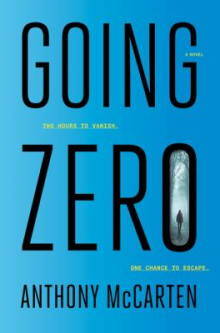
We all know that we are constantly being observed and monitored in today’s world. There are security and surveillance cameras on many homes, businesses, and on the traffic lights at intersections. ATMs and now self-check out machines in retail establishments also include cameras. Purchases, whether online or in a brick and mortar store can, and are, tracked. Many retail establishments offer “discount” cards or memberships that track customer purchases. And the personal information of banking and/or retail customers is regularly breached and sold, while many people willingly provide personal information on social media in the hopes that others will read/look at their posts. Going “off the grid” may not be impossible, but it is certainly a challenge.
But what if you wanted to become “unknown”? What if you accepted a challenge to “disappear” for a few weeks and, if you were able to accomplish that, you could win a considerable prize? Would you do it? Could you? This is the question Anthony McCarten explores in Going Zero.
Fusion is the latest development in surveillance software. Created by tech-prodigy Cy Baxter, Fusion is supposed to be able to find anyone, anywhere, whether they want to be found or not. The CIA is very interested in Fusion and they have partnered with Baxter to conduct a test: select ten individuals, give them a two hour “head start” and then locate them within a 30-day window. If anyone is able to elude Fusion for 30 days, they will be given $3 million dollars. If Fusion is able to track down all of the participants in 30 days or less, Baxter will receive a $90 million contract with the Federal Government.
Several of the participants are found within the first few hours because they underestimated what Fusion could, and would, do to find them. Others are more of a challenge. As the test progresses, one participant becomes a standout: Kaitlyn Day, a middle-aged librarian from Boston. As the test begins, Cy believes she will be one of the first to be recovered, with her preference for non-digital media and her “old school” way of thinking. What Cy doesn’t know is Kaitlyn’s reasons for joining the test and how they are the driving force behind every action she takes. Her motivations are just as strong, if not stronger, than Cy’s incentive to find her and win the defense contract.
In Going Zero, Anthony McCarten illustrates just how little of our lives, personal, professional, online or off, are actually in any way private in today’s world. He populates the test with people of various backgrounds and levels of technological competence, with the only shared attribute being that each one thinks that they have conceived of a fool-proof plan to win the $3 million. This also allows McCarten to illustrate, at times in frightening detail, just how difficult it is to disentangle oneself from the digital web we have collectively created.
With the clock ticking down on the 30-day test period, McCarten rachets up the tension as each participant is discovered and recovered while Kaitlyn’s location remains unknown. He also explores how the power inherent in the ability to use such powerful resources, supposedly only to be used for “the greater good,” may inevitably corrupt even the best intentions as frustrations grow and egos are allowed to dictate someone’s actions.
Going Zero is a thrilling and terrifying look at a world frighteningly like, and only a step or two away, from our own.